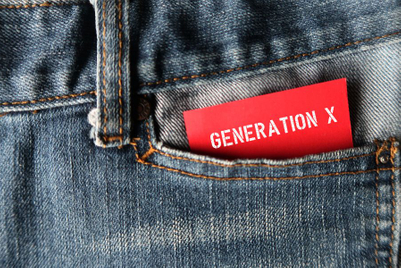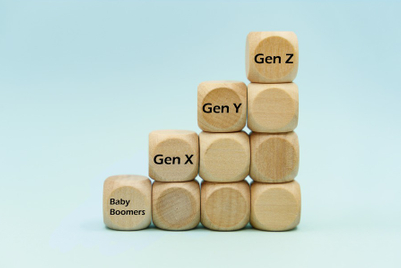
My playlists, my closet of endless denim jackets, even my somewhat inexplicable fondness for a prawn cocktail—every day it seems like I am turning more and more into my Gen X dad. It’s something that a lot of researchers are pointing out—Gen Z relates much more to their older Gen X counterparts than to the considerably closer-in-age Millennials.
Every generation thinks it’s invented something but just looking at Gen Z reveals that it is clearly redoing the Gen X trends of the 1980s and 90s.
Slackers and quiet quitters
Gen Z caused a huge stir around “quiet quitting”—doing their work only to the letter and refusing to do any more—as a protest against burnout, the cost of living and entry-level pay. According to Gallup, “quiet quitters” make up 50% of the American workforce, but a huge 82% of Gen Z are only doing the “bare minimum” to keep their jobs. More recently, the trend of desiring an “email job” has been popping up on TikTok and Instagram: A job where all you have to do is show up and “send emails."
It bears more than a little resemblance to the panic around the Gen X “slacker generation”, described by Time as a cohort who were “baulking” at the idea of work. They were known for being workshy, cynical and apathetic. Two generations united by a disdain for the system. We could— should?—even say that Gen X invented quiet quitting, but we lay that out in more detail in Finding the X-Factor: The Power of Gen X for Brands, a white paper that delves into the nitty-gritty of Gen X.
Vinyl and maximalist dressing
One similarity that sticks out most obviously to me is the trend cycle. Gen Z is pulling very heavily from the trends of the 80s and 90s. Consider the Hole-esque music of Olivia Rodrigo’s latest album and how Gen Z catapulted vinyl to the highest levels of sale since 1990 thanks to wanting support their favourite artists, bringing HMV back to Oxford Street. Even their uber-maximalist dressing harks back to the flamboyant New Romantics. Gen Z is singing happily from Gen X’s hymn sheet.
A rejection of Millennials
While it could be brushed under the carpet as being part of the well-documented 30-year nostalgia cycle, there might be a deeper reason for the similarities that Gen X and Gen Z share. The majority of Gen Z are the children of Gen Xers and, when pressed, Gen Xers said that their main goal of parenting was to “not bring up kids like Millennials." The decided difference in upbringing has created two generations united in their dislike of Millennials, with Gen X describing them as sellouts and Gen Z deriding them for being “cringe and boring." And as Gen Z do as much as they can to distance themselves from Millennials, they end up going full circle and becoming more like Gen X, the generation that Millennials were rebelling against.
Moreover, Gen Z’s dislike for Millennials stretches even further to their rejection of them and their culture. Gen Z is known for its inflated sense of irony, making bizzarro jokes on the internet, being unmarketable to and being messy. This stands in stark contrast to the palatable Millennial humour that Buzzfeed was founded on, their love of brand interaction on social media, and their perfectly posed “grammable” photos. But Millennials only developed these cultural signifiers as a rejection of Gen X’s own lackadaisical and slacker mentality, not to mention Gen X’s own brand of weirdness— the films Heathers and Do Revenge seem practically sequels and, just last year, there was a popular TikTok trend of dressing up as Patrick Bateman for Halloween. To Gen Z, the enemy of my enemy is my friend and, in an attempt to distance themselves from Millennials, they’ve adopted the cultural language of Gen X.
Despite being isolated from each other by about 30 years, Gen X and Gen Z have more in common with each other than perhaps either generation cares to admit. Whether it’s Gen Z’s love of old-school cool, or Gen X’s seemingly timeless trailblazing trends, it’s clear that to understand the difficult-to-market-to Gen Z, we have to get a real handle on Gen X first, as you can’t have one without the other. With matching denim jackets and a Spotify blend percentage of 100%, we just exist as Gen X's younger, cooler reflection.
Aliya Gilmore is a cultural strategist at Forsman & Bodenfors London


.jpg&h=334&w=500&q=100&v=20250320&c=1)

.jpg&h=334&w=500&q=100&v=20250320&c=1)
.jpg&h=334&w=500&q=100&v=20250320&c=1)
.jpeg&h=334&w=500&q=100&v=20250320&c=1)




.jpg&h=334&w=500&q=100&v=20250320&c=1)







